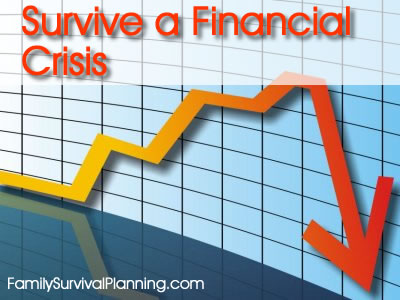
- HOME
- Financial Survival
- Financial Crisis
8 Ways to Survive a Financial Crisis

There are three types of financial crises that can happen at any time: currency crises, banking crises, and debt crises.
And, unlike a heart attack, financial crises don't just appear out of nowhere. They can be diagnosed ahead of time.
So, knowing this, doesn't it make sense to create a plan before a crisis hits?
Invest in emergency food storage now and enjoy peace of mind for the next 25 years. Don't miss out on the savings!
We live in an interconnected world and a global economy. A financial crisis that happens on the other side of the planet or the other side of the city can affect our financial survival. And we are well aware of countries and companies that are in trouble financially right now.
How secure are you financially?
Let's look at some of the things that may affect us financially:
 Inflation? Or Deflation?
Inflation? Or Deflation?- Government debt
- Fluctuating oil prices
- Inflation or deflation
- Employment and unemployment
- Incomes not rising along with inflation.
- Stock and bond market volatility
These are just a few of the indications of a financial crisis.
8 ways you can prepare and plan
- If you have debts, don't pay them off — just pay the minimums. Now I know that contradicts probably everything you've ever been told. But here's a question for you: Would you rather have no debt and no cash to pay rent and buy food, or would you rather have debt and some cash to survive? Cash, right? Me too. That’s why you should not get over zealous and try to pay down your debt right now. And, if hyper-inflation comes our way, which looks to be a sure possibility, debts will be paid with useless currency while saving your money to buy the things your family really needs - like food. Under “normal” circumstances, paying down your debt is the best strategy. But your financial survival plan is for times that are not normal.
- If you're paying a student loan, check the rules of your loan. Many government sponsored loans do not require you to pay payments if you are a student. Take a class (one that increases your skills or employability) for $50 and find out how to stop paying on the loan - for a while. (The number of children you have will also affect your payments - more kids, lower payments.)
- Renegotiate your credit card payments or interest. Call the credit card companies and ask if they will give you a better interest rate. Or take advantage of a low interest or no interest balance transfer (usually available to those with good credit).
- Stop contributing to your children's college savings plans. (You can start this up again when your financial situation improves.)
- Set up a budget. Go through your expenses with a fine-tooth comb and postpone, eliminate, or reduce any that you can.
- Do everything you can to keep your job. As long as you have income coming in, you should be okay. In a growth economy, it's much easier to find a new job, but in a crisis, jobs may be scarce.
- Find ways to have multiple streams of income. Can you make extra money with some skill or hobby you have developed?
- Buy gold or silver. Use any extra money to buy some gold and/or silver — not as an investment but to use for money if necessary. If precious metals rise as some predict, it could be worth enough to pay off all debts, even possibly your home.
The bottom line: hoard CASH by making minimum payments on all debts.
You might also want to put a bunch of that cash in a safe in your home rather than a bank. You know — just in case there's no electricity and the ATMs don't work, or the bank fails, or the FDIC runs out of money to pay everyone should there be a run on the bank.
Do not expect help from the government.
If you are a small business person and your business is in trouble, do you think for one minute that the government is going to bail YOU out? Can you raise your prices 100%, 500% so that you can make a profit and keep your business going in these tough economic conditions? Only if you want to kill it completely!
Self-reliant people do not need the government to provide all the services that it tries to give us. Governments that provide too much take away our power and, unfortunately, too many people are allowing it. They are willingly giving the government their power.
Being prepared isn't just putting some buckets of wheat, rice and beans into your storage. It also means being prepared to survive a financial crisis.
Helpful ideas abound, so plan spend time researching ways to become more self reliant, and therefore, able to survive a financial crisis in your life.














